- Home
- Edward Lee
The Backwoods Page 3
The Backwoods Read online
Page 3
She hugged him a bit too desperately. “No, honey. I’ll do this by myself while you hold down the fort. With any luck, I’ll be back in a week.”
“Give your sister my condolences. I’ll order flowers today and have them delivered. Oh, and not to sound too insensitive but . . . could you bring back a few of her crab cakes?”
Patricia chuckled. Crabmeat packaging seemed about as obscure a business as anyone could imagine, but Judy had done very well vamping up the old family business since Patricia’s investment of some venture capital. She’d paid back all the cash with interest, and the company was still growing. Judy had found her green thumb. Something rare and ideal about the waters of Agan’s Point produced unusually large blue crabs in abundance, and the meat was so uniquely sweet that the restaurants in the county outbid other crabmeat suppliers simply due to the quality. Hence, the long-shot business had succeeded tremendously. Even Byron, with his persnickety attitudes toward food, admitted that the best crab cakes he’d ever eaten were those made by Patricia’s sister. “I’ll bring you a box of them,” she promised.
The empty street sucked up the muffled echo when Byron closed the car trunk. But Patricia caught herself: “I’m such an airhead. I forgot my laptop—”
“You hope to do legal work in Agan’s Point?” her husband asked in amusement.
“Just to keep in touch with my associates on e-mail; plus I need my records with me in case there’s an emergency at the office,” she said, and scurried back into the condo.
It was an old, homey stone building, six large units total, and the equity had skyrocketed in the ten years they’d lived there. Patricia took the elevator up, listening to the drone that cleared her head and helped her feel solid about going “home” today. As for the condo’s interior decor, she’d deferred to Byron’s more modern, urbanized tastes—something that might be called post-art deco. It didn’t bother her, considering how little time she actually spent here; too often, for most city lawyers, the office felt more like the homestead. She brushed through the stark, light-toned living room, into the bedroom—the only room in the unit that she’d decorated to her own taste. Heavy paneling, dark hardwood furniture, and a plush four-poster bed. Colonial styles, though essentially passé in the modem city, had always appealed to her. She supposed it did remind her of her childhood on Agan’s Point, which seemed odd, since she never thought fondly of either her childhood or the town, a repressed, poor community in which she and her sister had been raised by dour, insensitive parents. God rest their souls, she paused enough to think. Their creaky old house on the hill, though, had been decorated similarly in the Colonial style. When she passed the dresser to grab her laptop and case, something made her pause, flicking her eyes to the framed picture of her and her sister smiling on the wide, heavily railed front porch of the house she was about to return to today. She’d been fifteen at the time the picture had been taken, Judy fourteen, both dressed in the modest sun-dresses they wore so frequently during the hot, southern Virginia summers. They were both freckleless in spite of inherent fair skin and bright red hair, and something about the photo made them appear even younger than they were. A glance back into youth gone by. Behind them both stood the oversized front door whose threshold Patricia would be crossing again in three or four hours. She wondered what memories would be waiting.
The next picture on the dresser showed her mother and father standing in the backyard. They’d begun parenthood in their late thirties—a late start that made Patricia wonder if she and Judy hadn’t really been accidents. Hard work in the crabbing business added still more years to her parents. Her father’s eyes looked back hard from the old photo, while her mother’s seemed bored. Both had grayed early, and just as neither of them smiled in the photograph, they’d seldom smiled in life. A mundane traffic accident had taken their lives the year Patricia would graduate from college. One thing she regretted was that they hadn’t lived long enough to see their daughters succeed, but not living long enough to see Judy marry Dwayne was something Patricia clearly didn’t regret.
Without thinking she turned the photo to face the wall. Her honesty about the matter had always bothered her, plaguing her with guilt. Patricia may have loved her parents, but she’d never really liked them very much. Her upbringing was an endless, unpleasant memory.
But there was one memory that hooked her right there when she was about to turn and go back out. You bad, greedy girl, she thought. The high, veiled bed she shared with Byron remained in disorder from last night’s gluttonous frolic. Maybe it was that plum wine from the restaurant? she wondered. It was definitely something, though, something that lit all her fuses at once. Byron wasn’t the greatest-looking man in the world, but Patricia knew that at their age, being sexually comfortable with a person was much more of a turn-on than muscles, a chiseled jaw, and other images of virility. She blushed at more recollections: He’d sensed her need all night, hauling her dress up to her waistline, dragging her panties off, and bullying her to the bed. He knew what she liked best, and he’d wasted no time in providing it, not even bothering to take his own clothes off before beginning an oral excursion of her body that lasted for over an hour, so delicately and featherlight at first, but graduating to animalistic fervor. Patricia came in multiples, biting her own knees like apples. Several times her shrieks of pleasure reverberated throughout the condo. We’re lucky the neighbors didn’t call the police, she thought now. A cruder thought occurred to her, maximizing her guilt: Last night I practically used my husband’s face for a bicycle seat, and I didn’t even do anything for him afterward. Her orgasms had so worn her out that she fell sound asleep immediately afterward. . . .
I keep telling him that I’m going to make things up to him now that I’m a partner. She frowned to herself. Great start, Patricia. You’re a selfish bitch.
She gave herself a final checkover in the mirror, happy that faded jeans, sneakers, and an old blouse wouldn’t be overdoing it for returning home. True, her bralessness left little to the imagination, but she hardly cared. Maybe I skipped the bra on purpose and just didn’t realize it? she wondered. Her breasts stretching the blouse and her nipples ghosting through it would leave her husband with a final sexy image of her when she left.
Ready. she thought. She took a breath and turned out the light. Then she went back outside, kissed her loving husband good-bye, and embarked on the three-hour drive that would take her back into the heart of her childhood memories—
—and the unbidden recollection of the awful thing that had happened to her so long ago.
(II)
Sometimes you just can’t win. The thought occurred to him when he opened his wallet and saw but four single dollar bills in there just after he’d walked in to the Donut King at the edge of town. A dozen doughnuts, by the way, cost $4.69, and he didn’t dare ask Trey for the extra.
That would be humiliating. After all, Sutter was the chief.
So he bought one doughnut and a cup of coffee and walked out.
“Cuttin’ back?” Trey asked. “Usually ya git yourself a dozen.”
“Yeah,” he lied. “Doc said to lose weight if I wanna live to collect my Social fuckin’ Security. I’ve been payin’ into the bitch for damn near fifty years, so I ain’t gonna let myself get ripped off.”
It would be just his luck, wouldn’t it?
Chief Sutter wasn’t generally prone to cynicism, an attitude he was inclined to regard as unhealthy. He was a levelheaded man, a fair one and probably more goodhearted than most police chiefs nearing retirement. Father Darren at church reminded them every Sunday that taking for granted what one had was a sin, sort of a slap to the face of God, Who’d made this world and everything in it as a gift to mankind. Every day above ground was a good day, a blessing and another opportunity to celebrate the joy of life, and most would probably agree.
Fuck me and the horse I rode in on, came the sour thought.
Even good men had bad days, and that was what Chief Sutter woke up to this
morning, his three hundred-pound frame smothered in a swelter, and his wife, who weighed not much less, snoring like a mountain gorilla. The air conditioner had crapped out overnight—what a splendid thing to happen in the South, during summer’s tightest squeeze.
It would probably cost him two grand to replace, and with the two mortgages, property taxes going up, and a wife who’d maxed out the credit cards, Chief Sutter didn’t know what he was going to do.
Just ain’t right, he thought later, on his way to the station. I’ve worked my ass off my whole damn life helping other people, and what have I got to show for it?
Not much, right now. Just a lot of debt, and damn little satisfaction.
“Still bothered about your money problems?” Trey asked from the passenger seat. Sgt. William Trey was Sutter’s second in charge and officially the department’s deputy chief. Second in charge didn’t mean a whole lot on a two-man police department, but Sutter figured he deserved the acknowledgment. Trey was fifty now but tended to still act like the brazen, feisty cockhound he’d been when Sutter’d hired him almost three decades ago. A local boy with good intentions, and who respected his home. He sort of looked like Tom Cruise, if Tom Cruise had never made it. But he was still agile and fairly fit, which—considering his weight—Sutter sadly was not. When he needed someone to jump over a fence to run down some punks, Sutter was glad for such a deputy. And he had a way of painting a bad situation with a happier color. “Look at it this way, Chief. All married men got money problems. Take us, for example. We both got wives the size of a coupla full-grown Berkshire hogs, and the only difference is they eat more than a coupla full-grown Berkshire hogs. That costs money, Chief, and it’s the husband’s job to provide it. A fat wife is a sign that a man is providin’ for her, which is what God wants.”
Chief Sutter appreciated the spin but wasn’t sure if it was working.
“We‘se both married in the eyes of the Lord; that’s how it’s supposed to be,” Trey went on. “You’re not seein’ my point now, are ya?”
“Well . . .”
“Here’s what Father Darren would say. Why is it you think you ain’t got enough money?”
“Well, ’cos—”
“’Cos yer wife spends half the money you work your ass off for on food, and you spend the other half on keepin’ a roof over her head and her big ass in a car, right?”
Sutter gave him an alarmed glance. “Yeah, and it’s a right pain in the ass and it’s pissin’ me off.”
Trey nodded knowingly. “And here’s what Father Darren would say. He’d say that a wife who’s fat ‘n’ happy is the wife of a God-lovin′ man, a man who’s doin’ his best to live by His laws.”
Sutter blinked. “That what he’d say?”
“You can roger that, Chief, and here’s why. ‘Cos if yer fine wife, June, was bone-skinny and didn’t have no cable TV, or no car a’ her own, and had ta live in a shit little house, then that′d mean that you weren’t livin’ by His laws.”
Sutter sighed. “I hope you’re right, Trey, but what ya don’t understand is I’m chokin’ on a right shitload of debt, and now I somehow gotta find me two grand for a new air conditioner. I’m real happy that I’m livin’ by God’s laws, but I sure don’t see God buyin′ me a new air conditioner.”
Trey pointed. “But don’t ya see? He will. All you gotta do is ask Him. God provides to those who rightly deserve His provisions. Do it right now, in yer head. Ask God ta forgive ya for not managin’ your finances proper, and ask Him to help ya out. Go on. Do it. Remember what Father Darren says: A man should never be embarrassed to talk to God.”
Sutter slumped behind the wheel of the cruiser. Can’t hurt, I guess. He closed his eyes and prayed: God, what I’m askin′ ya to do is to forgive me for bein′ selfish ′n′ ungrateful ’n’ for takin′ your gifts for granted. Forgive me for not lookin’ hard enough to see how you want things to be, and forgive me for not managin′ my finances proper and for lettin′ things get outta hand. I need your help, God, and I mean I really, really need the scratch for a new air conditioner, ’cos if I can’t dig it up, June’ll be whinin’ worse than a truckload of weasels. . . .
When Chief Sutter opened his eyes again, he felt better. He didn’t feel any richer, but he definitely felt better.
“Good man, Chief. When you talk, God listens.” Trey sipped his coffee in some seeming assurance. “He listens to me, I can tell ya that. I ain’t braggin’, but let me show ya something.” He slipped out his wallet and withdrew two slips of paper. “Now, I make less than you, and if anything my wife, Marcy, eats even more than your wife, but look at this.”
He passed the slips of paper to Sutter.
Holy . . . shit! They were bank balance receipts. “Trey, I say you sure do manage your money proper. Jiminy Christmas.” Trey had five grand in his checking and eight in his savings.
Trey took back the papers, nodding. “It’s ’cos God listens when I talk to him. God looks at me and ya know what He sees? He sees a man who’s had plenty of chances to go astray but chose not to. He sees a cop, same as He sees you. He sees a man bustin’ his ass to uphold the law and maintain peace and decency. So God don’t leave a man like that out to dry. Instead, He helps him out every so often. Just like He’s gonna help you.″
Sutter reflected on the words. He remembered Trey back in his younger days, before marriage, before typical social and domestic responsibilities had come into his life. The man had been an absolute nutcase, a hard-drinkin’, hard-partyin’ character. Gals would follow that boy down the street, Sutter thought. Spent mos a’ his money on bar-hoppin’, hot rods, and women. . . . But life had changed Sgt. William Trey—a change for the good. He’d used the force of his will to change himself into a good man, and now good things were befalling him.
Would the same good things befall Sutter?
He needed some good things now.
It was almost as if Trey were reading his mind when he said, “Good things, Chief.”
“What’s that?”
“Good things happen to men who put their trust in God.”
Sutter stared out the window. What Trey was telling him just made him feel better and better. He shook his head. “Trey, I known you for goin’ on thirty years, and in all that time I had no idea you had so much religion in ya.”
“Ain’t no secret; ain’t no big deal.” Trey calmly sipped more coffee. “Live by God’s laws, and He will grant blessings upon you.” But in that same moment, Trey’s eyes shot wide out the window at a figure at the side of the road. It was a woman, a woman flagging them down, and that was when the very God-fearing Sergeant Trey exclaimed, “Holy sufferin’ shit, Chief! Would you get a load of the tits on that piece of ass?”
Two
(I)
Patricia, of course, had forgotten. It had been five years, hadn’t it?
Five years since her return to Agan’s Point.
The Cadillac cruised silently, comfortingly, but as the city had faded behind her, and the interstate highways had eventually given over to long, winding, and very rural county roads, the words began to haunt her:
Oh, my God, girl. How could you let something like that happen?
They were her father’s words, less than a week after her sixteenth birthday. . . .
The look in his eye, and the words he’d chosen. Like I let it happen, she thought now in an overwhelming mental darkness. Like I wanted it to happen . . .
She’d never been more hurt in her life.
She’d felt good, hadn’t she? Her wonderful, if selfish, love session with Byron last night might have had something to do with it, but when she pulled away from the condo, knowing full well where she was going, she felt good, and that was something she didn’t expect. Watching the sun bloom as she drove, opening the Cadillac up on Interstate 95, and moving forward . . . It seemed to clear her head of all the city’s stresses and the endless intricacies of work. Indeed, Patricia felt clean, new; she felt purged. Until . . .
Her mo
od began to wilt in increments. She knew what she was doing. Putting it off. But I can’t put it off. All I can do is dawdle, procrastinate. She wound up driving through the historic district in Richmond, and blowing an hour looking for a place to have breakfast. Same thing through Norfolk, for lunch. She was turning the three-hour drive into an all-day journey, as if getting to Agan′s Point later would ease some of her distress. But she knew it wouldn’t. I’m torturing myself, she thought.
Hours later familiar road signs began to pop up, signals that she wasn′t so much driving away from her exhausting lifestyle in Washington, but instead driving to something much more stressful. The far less traveled Route 10 seemed to throw the signs in her face as she raced past, towns with names like Benn’s Church, Rescue, and Chuckatuck. More and more of her frame of mind began to melt. Then a sign flashed by:
DISMAL SWAMP—10 MILES.
And more signs, with stranger names:
LUNTVILLE—6 MILES.
CRICK CITY—11 MILES.
MOYOCK—30 MILES.
Oh, God, Patricia thought.
She was beginning to feel sick, and with the sickness came a resurfacing. She hadn’t thought of the psychologist in a long time, a keen, incisive bald man named Dr. Sallee. And she’d seen him only once, just after her return from her last trip to Agan’s Point five years ago, when her despair seemed insurmountable.
“We bury traumas,” he’d told her. “In a variety of different ways, but the effect remains the same. Some people deal with their traumas by confronting them immediately, and then forgetting about them, while others deal best by forgetting about them first and then never confronting them because there’s no apparent need. That’s what you’re doing, Patricia, and there’s nothing wrong with that. There’s no apparent need because you relocated yourself from the premises of the trauma.”

 In the Year of Our Lord 2202
In the Year of Our Lord 2202 The Minotauress
The Minotauress Terra Insanus
Terra Insanus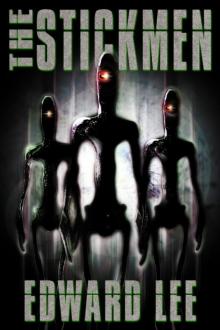 The Stickmen
The Stickmen Flesh Gothic by Edward Lee
Flesh Gothic by Edward Lee Family Tradition
Family Tradition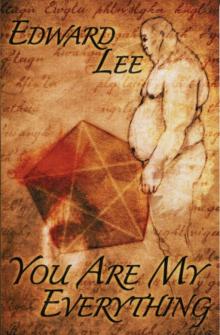 You Are My Everything
You Are My Everything The Backwoods
The Backwoods The Teratologist
The Teratologist Smoke and Pickles
Smoke and Pickles Buttermilk Graffiti
Buttermilk Graffiti Dahmer's Not Dead
Dahmer's Not Dead Quest for Sex, Truth & Reality
Quest for Sex, Truth & Reality The Innswich Horror
The Innswich Horror Brides Of The Impaler
Brides Of The Impaler Goon
Goon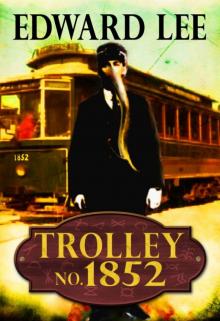 Trolley No. 1852
Trolley No. 1852 Sacrifice
Sacrifice Monster Lake
Monster Lake Succubi
Succubi Lucifer's Lottery
Lucifer's Lottery Monstrosity
Monstrosity The House
The House The Dunwich Romance
The Dunwich Romance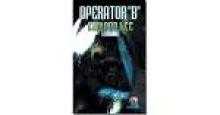 Operator B
Operator B Bullet Through Your Face (improved format)
Bullet Through Your Face (improved format) Grimoire Diabolique
Grimoire Diabolique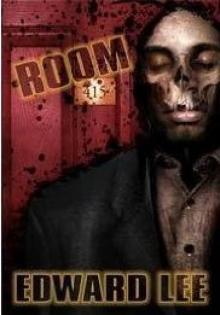 Room 415
Room 415 The Messenger (2011 reformat)
The Messenger (2011 reformat) Incubi
Incubi The Black Train
The Black Train House Infernal by Edward Lee
House Infernal by Edward Lee City Infernal
City Infernal Creekers
Creekers The Haunter Of The Threshold
The Haunter Of The Threshold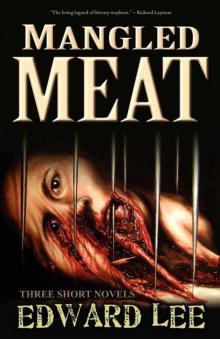 Mangled Meat
Mangled Meat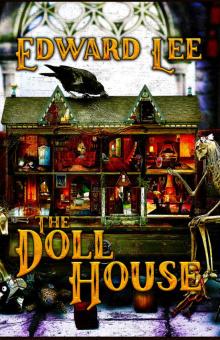 The Doll House
The Doll House Header 2
Header 2 Bullet Through Your Face (reformatted)
Bullet Through Your Face (reformatted)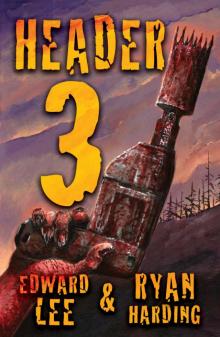 Header 3
Header 3 Infernal Angel
Infernal Angel Pages Torn From a Travel Journal
Pages Torn From a Travel Journal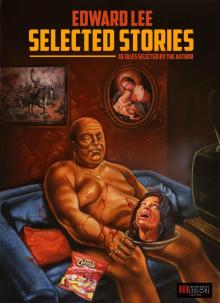 Edward Lee: Selected Stories
Edward Lee: Selected Stories The Bighead
The Bighead The Chosen
The Chosen